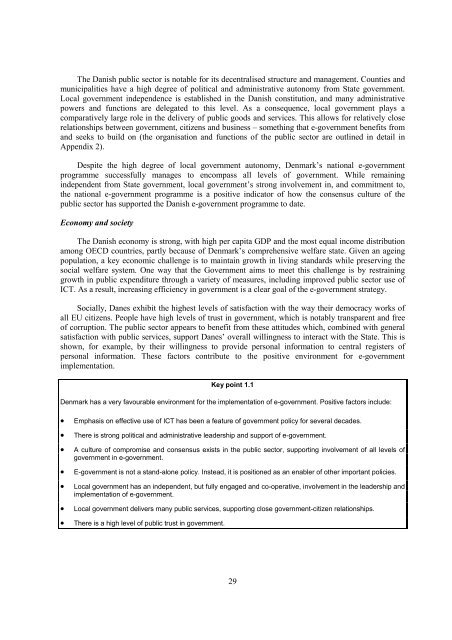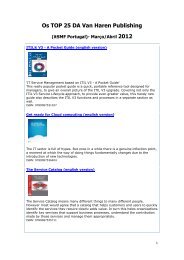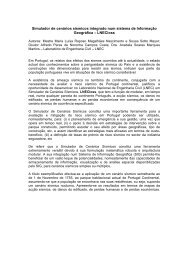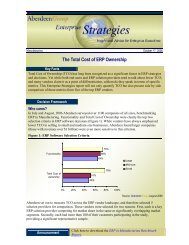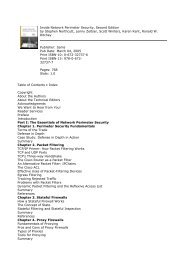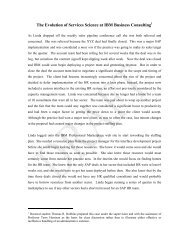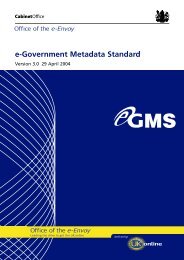OECD Peer Review of E-Government in Denmark - ePractice.eu
OECD Peer Review of E-Government in Denmark - ePractice.eu
OECD Peer Review of E-Government in Denmark - ePractice.eu
You also want an ePaper? Increase the reach of your titles
YUMPU automatically turns print PDFs into web optimized ePapers that Google loves.
The Danish public sector is notable for its decentralised structure and management. Counties and<br />
municipalities have a high degree <strong>of</strong> political and adm<strong>in</strong>istrative autonomy from State government.<br />
Local government <strong>in</strong>dependence is established <strong>in</strong> the Danish constitution, and many adm<strong>in</strong>istrative<br />
powers and functions are delegated to this level. As a consequence, local government plays a<br />
comparatively large role <strong>in</strong> the delivery <strong>of</strong> public goods and services. This allows for relatively close<br />
relationships between government, citizens and bus<strong>in</strong>ess – someth<strong>in</strong>g that e-government benefits from<br />
and seeks to build on (the organisation and functions <strong>of</strong> the public sector are outl<strong>in</strong>ed <strong>in</strong> detail <strong>in</strong><br />
Appendix 2).<br />
Despite the high degree <strong>of</strong> local government autonomy, <strong>Denmark</strong>’s national e-government<br />
programme successfully manages to encompass all levels <strong>of</strong> government. While rema<strong>in</strong><strong>in</strong>g<br />
<strong>in</strong>dependent from State government, local government’s strong <strong>in</strong>volvement <strong>in</strong>, and commitment to,<br />
the national e-government programme is a positive <strong>in</strong>dicator <strong>of</strong> how the consensus culture <strong>of</strong> the<br />
public sector has supported the Danish e-government programme to date.<br />
Economy and society<br />
The Danish economy is strong, with high per capita GDP and the most equal <strong>in</strong>come distribution<br />
among <strong>OECD</strong> countries, partly because <strong>of</strong> <strong>Denmark</strong>’s comprehensive welfare state. Given an age<strong>in</strong>g<br />
population, a key economic challenge is to ma<strong>in</strong>ta<strong>in</strong> growth <strong>in</strong> liv<strong>in</strong>g standards while preserv<strong>in</strong>g the<br />
social welfare system. One way that the <strong>Government</strong> aims to meet this challenge is by restra<strong>in</strong><strong>in</strong>g<br />
growth <strong>in</strong> public expenditure through a variety <strong>of</strong> measures, <strong>in</strong>clud<strong>in</strong>g improved public sector use <strong>of</strong><br />
ICT. As a result, <strong>in</strong>creas<strong>in</strong>g efficiency <strong>in</strong> government is a clear goal <strong>of</strong> the e-government strategy.<br />
Socially, Danes exhibit the highest levels <strong>of</strong> satisfaction with the way their democracy works <strong>of</strong><br />
all EU citizens. People have high levels <strong>of</strong> trust <strong>in</strong> government, which is notably transparent and free<br />
<strong>of</strong> corruption. The public sector appears to benefit from these attitudes which, comb<strong>in</strong>ed with general<br />
satisfaction with public services, support Danes’ overall will<strong>in</strong>gness to <strong>in</strong>teract with the State. This is<br />
shown, for example, by their will<strong>in</strong>gness to provide personal <strong>in</strong>formation to central registers <strong>of</strong><br />
personal <strong>in</strong>formation. These factors contribute to the positive environment for e-government<br />
implementation.<br />
Key po<strong>in</strong>t 1.1<br />
<strong>Denmark</strong> has a very favourable environment for the implementation <strong>of</strong> e-government. Positive factors <strong>in</strong>clude:<br />
• Emphasis on effective use <strong>of</strong> ICT has been a feature <strong>of</strong> government policy for several decades.<br />
• There is strong political and adm<strong>in</strong>istrative leadership and support <strong>of</strong> e-government.<br />
• A culture <strong>of</strong> compromise and consensus exists <strong>in</strong> the public sector, support<strong>in</strong>g <strong>in</strong>volvement <strong>of</strong> all levels <strong>of</strong><br />
government <strong>in</strong> e-government.<br />
• E-government is not a stand-alone policy. Instead, it is positioned as an enabler <strong>of</strong> other important policies.<br />
• Local government has an <strong>in</strong>dependent, but fully engaged and co-operative, <strong>in</strong>volvement <strong>in</strong> the leadership and<br />
implementation <strong>of</strong> e-government.<br />
• Local government delivers many public services, support<strong>in</strong>g close government-citizen relationships.<br />
• There is a high level <strong>of</strong> public trust <strong>in</strong> government.<br />
29


